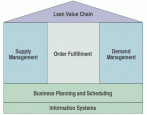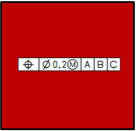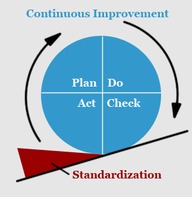|
This course is available in half-day and one-day formats and is designed to teach participants the philosophy and requirements of the ISO 9001:2015 standard, or your sector equivalent (ISO 13485, AS 9100, etc.) Our half-day session is intended for senior managers and leaders, while the full-day session is intended for personnel who will be involved in implementing the requirements of the Standard.
Each presentation draws on the years of experience of our experts and examples and workshops are selected specifically to suit your organization's sector and customers. The Process Approach of the Standard is emphasized, and workshops ensure that each participant understands the Process Approach and is ready to implement it in their organization. |
|
This one day course is designed to teach participants the fundamentals of the ISO 14001:2015 Environmental Management System (EMS). Upon completion, participants will understand how to identify the environmental aspects of their company and how to set measurable goals to reduce their impacts on the environment.
This course can be combined with our two day internal auditor training to qualify your EMS internal audit team. The session includes a workshop where small groups begin to identify the key environmental aspects and impacts of their organization. This hands-on approach will reinforce the lecture, and ensure full understanding by all participants. |
|
This two day course is designed to teach participants the basics of the Quality Management System adopted by your organization (ISO 9001, ISO 13485, AS 9100 etc), and provide them with the tools and techniques to perform a competent "Process Approach" assessment of the effectiveness of their system.
The foundation of this training is Devos Associates' unique "Risk is the Compass" ™ approach to auditing. This model has been published and presented at several conferences and is widely recognized as the leading model for incorporating business risk when conducting a Process Approach audit. The training concludes with a real internal audit under the guidance of the course trainer to reinforce the training and provide valuable feedback regarding their performance and effectiveness. |
|
This course is offered in two-day and three-day formats and introduces the concepts of Lean Methods and stresses the philosophy behind a Lean culture. The largest obstacle to overcome is one of attitude and engrained company culture. The differences between mass production and Lean Manufacturing attitudes are explored and leadership issues are discussed.
In the three day session, a half-day workshop models the organization’s own process, and creates both a current-state value stream map and a future-state value stream map. This introduction is tailored to manufacturing or the service sector, as appropriate. |
|
This five-day project is intended to teach the fundamental Lean principles and apply each one to a real project within the organization. This is a more in-depth and practical training than the introductory course and results in a re-engineered process at the end of the week.
Each topic is treated as a lecture and then immediately applied to the project being improved. Topics include 5-S, Seven Wastes, one-piece flow, Kanban, SMED, OEE and Value Stream Mapping. Participants in the event will be those employees and support functions directly responsible for the performance of the particular process being re-engineered. |
|
Design of Experiments is a three-day course that begins with first principles and operational definitions. Emphasis is placed on distinguishing between significant factors and noise. The quality statistics review considers the role of process stability and capability in interpreting the results of experimentation. Measurement Systems Analysis is introduced to assess the appropriateness of a measurement process prior to that process being used in experimentation.
Weibull analysis is used to understand the behavior of distributions, and to assess whether the resulting data set is the result of significant causal factors. Knowledge gained will guide the iteration of the problem statement, and derive hypotheses to test. Experimental strategies and designs are instructed from two definitive texts on the subject. |
|
This two day course is a perfect introduction to Geometric Dimensioning and Tolerancing (GD&T). This session is designed for practitioners who are required to read GD&T on engineering drawings, such as QA Engineers, Inspectors, and CMM Operators.
GD&T is the language of engineering and manufacturing, and competency in understanding reference frames and properly interpreting tolerances is an essential skill for everyone in a technical role in a manufacturing organization. Learning objectives are to learn the rules, definitions and symbols of ANSI Y14.5-2009, along with and understanding of datum structure, feature control frames, and shape size and location of tolerance zones. |
|
This two day course is designed to teach participants the basics of the Failure Modes and Effects Analysis (FMEA) methodology. No matter what industry or service sector your organization supports, FMEA tools are among the most effective tool for any quality engineer.
During process design, the FMEA is likely the most powerful tool that Process Engineers and Managers have at their disposal. FMEA training can assist an organization to anticipate failure and prevent problems before they occur. Organizations can choose between separate Design FMEA and Process FMEA courses, according to their needs. |
|
This one-day course introduces participants to an approach to identifying and implementing continuous improvement projects. No matter what your product or service, Continuous Improvement is the cornerstone of an effective Quality System.
The most challenging aspect of sustained improvement is creating an environment for improvement. Lectures include tips on change management and those inhibitors that can become obstacles to adopting continuous improvement as a philosophy. Emphasis is placed creating a customized approach for identifying and managing continuous improvement initiatives for each organization. Disciplines are presented as a fact-based, standardized approach to problem solving. |
|
This two-day classroom session is designed to teach participants to perform effective problem-solving, based on proven approaches. Emphasis is placed on seeking root-cause as a fact-based, standardized approach to problem solving. In addition, the Seven Tools of Quality which support each of the steps are introduced. Several problem solving approaches are addressed, including 8-Disciplines, DOT*STAR, Five-Why, Is/Is Not, and Logic Trees. Examples build throughout the course to reinforce understanding and the use of the problem-solving tools.
This training can be coupled with the investigation and solving of a real-world problem within the organization. |










